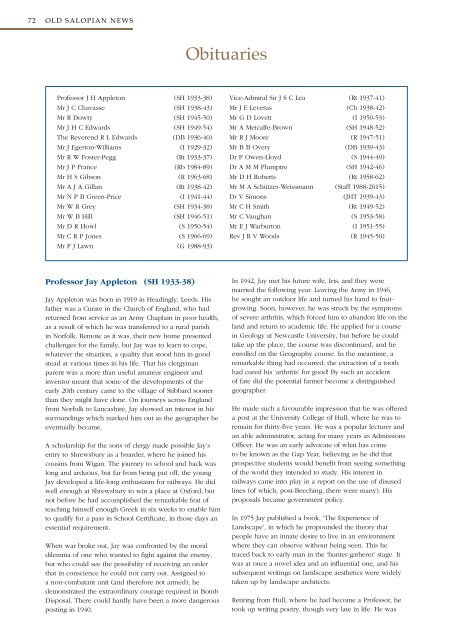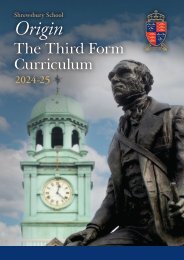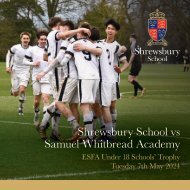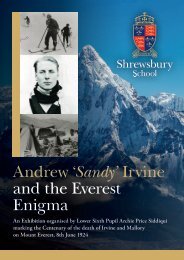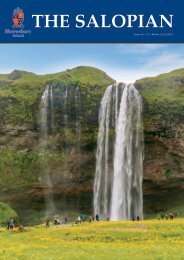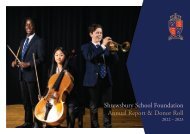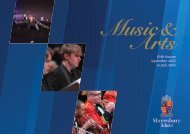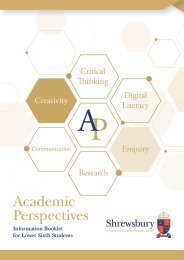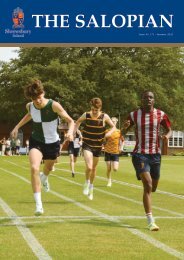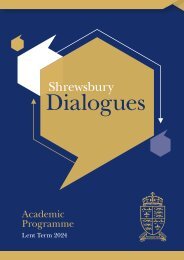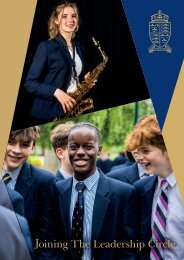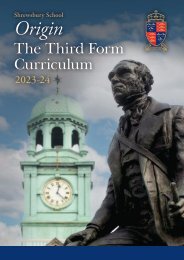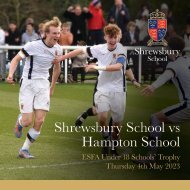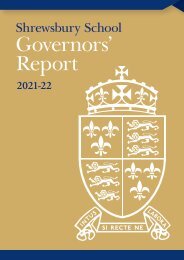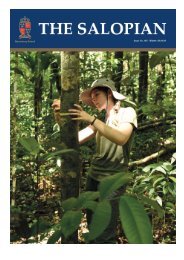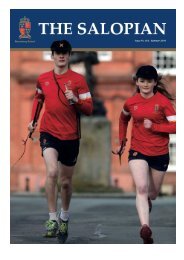The Salopian no. 157 - Winter 2015
You also want an ePaper? Increase the reach of your titles
YUMPU automatically turns print PDFs into web optimized ePapers that Google loves.
72<br />
OLD SALOPIAN NEWS<br />
Obituaries<br />
Professor J H Appleton (SH 1933-38)<br />
Mr J C Chavasse (SH 1938-43)<br />
Mr R Dowty (SH 1945-50)<br />
Mr J H C Edwards (SH 1949-54)<br />
<strong>The</strong> Reverend R L Edwards (DB 1936-40)<br />
Mr J Egerton-Williams (I 1929-32)<br />
Mr R W Foster-Pegg (Rt 1933-37)<br />
Mr J P France (Rb 1984-89)<br />
Mr H S Gibson (R 1963-68)<br />
Mr A J A Gillan (Rt 1938-42)<br />
Mr N P B Green-Price (I 1941-44)<br />
Mr W R Grey (SH 1934-38)<br />
Mr W B Hill (SH 1946-51)<br />
Mr D R Howl (S 1950-54)<br />
Mr C R P Jones (S 1966-69)<br />
Mr P J Lawn (G 1988-93)<br />
Vice-Admiral Sir J S C Lea (Rt 1937-41)<br />
Mr J E Levetus (Ch 1938-42)<br />
Mr G D Lovett (I 1950-53)<br />
Mr A Metcalfe-Brown (SH 1948-52)<br />
Mr R J Moore (R 1947-51)<br />
Mr B B Overy (DB 1939-43)<br />
Dr P Owen-Lloyd (S 1944-49)<br />
Dr A M M Plumptre (SH 1942-46)<br />
Mr D H Roberts (Rt 1958-62)<br />
Mr M A Schützer-Weissmann (Staff 1988-<strong>2015</strong>)<br />
Dr V Simons (JHT 1939-43)<br />
Mr C H Smith (Rt 1949-52)<br />
Mr C Vaughan (S 1953-58)<br />
Mr E J Warburton (I 1951-55)<br />
Rev J R V Woods (R 1945-50)<br />
Professor Jay Appleton (SH 1933-38)<br />
Jay Appleton was born in 1919 in Headingly, Leeds. His<br />
father was a Curate in the Church of England, who had<br />
returned from service as an Army Chaplain in poor health,<br />
as a result of which he was transferred to a rural parish<br />
in Norfolk. Remote as it was, their new home presented<br />
challenges for the family, but Jay was to learn to cope,<br />
whatever the situation, a quality that stood him in good<br />
stead at various times in his life. That his clergyman<br />
parent was a more than useful amateur engineer and<br />
inventor meant that some of the developments of the<br />
early 20th century came to the village of Stibbard sooner<br />
than they might have done. On journeys across England<br />
from Norfolk to Lancashire, Jay showed an interest in his<br />
surroundings which marked him out as the geographer he<br />
eventually became.<br />
A scholarship for the sons of clergy made possible Jay’s<br />
entry to Shrewsbury as a boarder, where he joined his<br />
cousins from Wigan. <strong>The</strong> journey to school and back was<br />
long and arduous, but far from being put off, the young<br />
Jay developed a life-long enthusiasm for railways. He did<br />
well e<strong>no</strong>ugh at Shrewsbury to win a place at Oxford, but<br />
<strong>no</strong>t before he had accomplished the remarkable feat of<br />
teaching himself e<strong>no</strong>ugh Greek in six weeks to enable him<br />
to qualify for a pass in School Certificate, in those days an<br />
essential requirement.<br />
When war broke out, Jay was confronted by the moral<br />
dilemma of one who wanted to fight against the enemy,<br />
but who could see the possibility of receiving an order<br />
that in conscience he could <strong>no</strong>t carry out. Assigned to<br />
a <strong>no</strong>n-combatant unit (and therefore <strong>no</strong>t armed), he<br />
demonstrated the extraordinary courage required in Bomb<br />
Disposal. <strong>The</strong>re could hardly have been a more dangerous<br />
posting in 1940.<br />
In 1942, Jay met his future wife, Iris, and they were<br />
married the following year. Leaving the Army in 1946,<br />
he sought an outdoor life and turned his hand to fruitgrowing.<br />
Soon, however, he was struck by the symptoms<br />
of severe arthritis, which forced him to abandon life on the<br />
land and return to academic life. He applied for a course<br />
in Geology at Newcastle University, but before he could<br />
take up the place, the course was discontinued, and he<br />
enrolled on the Geography course. In the meantime, a<br />
remarkable thing had occurred; the extraction of a tooth<br />
had cured his ‘arthritis’ for good! By such an accident<br />
of fate did the potential farmer become a distinguished<br />
geographer.<br />
He made such a favourable impression that he was offered<br />
a post at the University College of Hull, where he was to<br />
remain for thirty-five years. He was a popular lecturer and<br />
an able administrator, acting for many years as Admissions<br />
Officer. He was an early advocate of what has come<br />
to be k<strong>no</strong>wn as the Gap Year, believing as he did that<br />
prospective students would benefit from seeing something<br />
of the world they intended to study. His interest in<br />
railways came into play in a report on the use of disused<br />
lines (of which, post-Beeching, there were many). His<br />
proposals became government policy.<br />
In 1975 Jay published a book, ‘<strong>The</strong> Experience of<br />
Landscape’, in which he propounded the theory that<br />
people have an innate desire to live in an environment<br />
where they can observe without being seen. This he<br />
traced back to early man in the ‘hunter-gatherer’ stage. It<br />
was at once a <strong>no</strong>vel idea and an influential one, and his<br />
subsequent writings on landscape aesthetics were widely<br />
taken up by landscape architects.<br />
Retiring from Hull, where he had become a Professor, he<br />
took up writing poetry, though very late in life. He was


